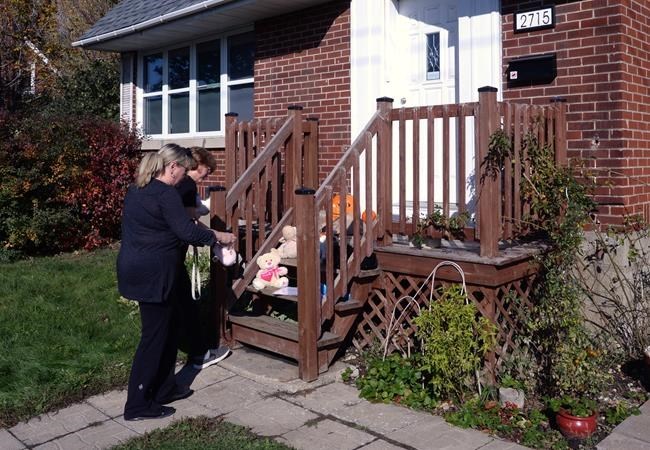
Neighbours leave stuffed animals and toys at the doorstep of a home in Montreal on Wednesday, Oct. 23, 2019. The Quebec's coroner's report into the 2019 deaths of Jonathan Pomares, 40, and his seven-year-old son and five-year-old daughter is calling for the creation of a crisis unit in Montreal, for greater monitoring on domestic violence following suicide attempts. THE CANADIAN PRESS/Ryan Remiorz
Republished April 12, 2022 - 3:28 PM
Original Publication Date April 12, 2022 - 2:56 PM
MONTREAL - A Quebec coroner's report into the 2019 deaths of a Montreal father and his two young children is calling for better communication among health professionals to monitor the risk of domestic violence after suicide attempts.
The bodies of Jonathan Pomares, his seven-year-old son Hugo and five-year-old daughter Élise were found on Oct. 22, 2019, in the family's east-end Montreal house and were later confirmed as two murders followed by suicide.
Coroner Stéphanie Gamache issued several recommendations on Tuesday, saying there's a need to change rules surrounding confidentiality of patient files.
The coroner's report states that shortly before the tragedy, Pomares was taken to the hospital for a suicide attempt after his former wife told him she wanted to end the relationship.
Pomares, 40, was seen by three psychiatrists at two hospitals and was released after the third one concluded he didn't represent an imminent danger. It was a week later that he killed his children before taking his own life.
The coroner found that the first two psychiatrists had concluded Pomares needed to stay longer in the hospital. Gamache said the third psychiatrist who examined Pomares didn’t have the full portrait of the situation because he wasn’t able to communicate with Pomares' former wife.
The fact that Pomares had been hospitalized for a suicide attempt 10 days before his killings was a red flag that could not be ignored, she said.
"In such a situation where a suicide attempt occurs in a context of imminent separation, it is imperative not to rely solely on the patient's words," Gamache said. She recommends the creation of a grid incorporating an outside view of the patient's situation to evaluate the risk of homicide in such situations.
This report by The Canadian Press was first published on April 12, 2022.
---
This story was produced with the financial assistance of the Meta and Canadian Press News Fellowship.
News from © The Canadian Press, 2022